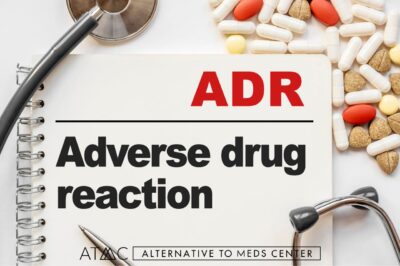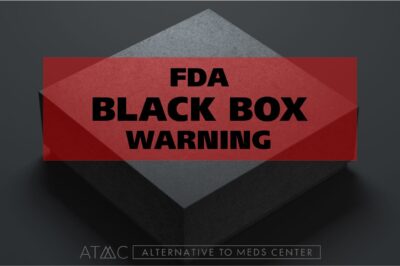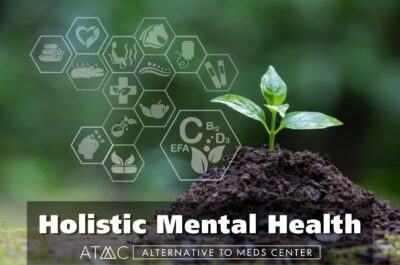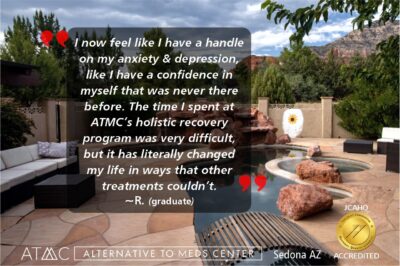Last Updated on June 13, 2023 by
Alternative to Meds Editorial Team
Medically Reviewed by Dr Samuel Lee MD
Table of Contents:
People take prescription drugs to relieve the effects that injury, disease, surgery, and other ailments can have on the body and mind. However, many of these pharmaceuticals often cause negative side effects that can be worse than the original condition they were meant to treat. Others are highly addictive, adding the risk of pharmaceutical dependency to the already long list of side effects.
Can natural alternatives to prescription drugs be the answer?
Risks of Prescription Drugs

Adverse drug reactions from prescription medications are the 3rd leading cause of death in the United States and Europe, only surpassed by heart disease and cancer.1
Another problem with the rising use of pharmaceuticals is that they are being diverted to non-medical use. According to a review of the subject published in the Addiction Journal, law enforcement is not able to curtail this trend. However, curtailing the number of prescriptions that get written would provide a much more effective measure to bring this problem under control.2
Prescription Drug Side Effects
Modern medicine has largely evolved as a drug-based craft.
For instance, when arsenic was commonly used as a remedy in the early 1800s, there was considerable debate as to whether it was the arsenic that was causing lesions, or whether the lesions were part of the “cure.” Most arsenic-based medicines were discontinued after the introduction of antibiotics. However, in the 1970s, an arsenic-based medicine provided dramatic remission of a particular type of leukemia.3
Mercury is another drug that was commonly used to treat afflictions such as syphilis for centuries, until 1943 when penicillin was discovered. More recent clinical research has determined mercury to be neurotoxic to humans, and associated with renal, developmental, and neurological disorders.4
Drugs and adverse effects go hand in hand, in virtually all cases. One must carefully inform oneself if there are better, safer options, rather than simply taking a drug as the first choice in treatment.
The Role of the FDA in Protecting Public Health

It is always safest to inform oneself, listen to FDA warnings, and always consider all options before deciding on medication alone. There may be a safer, drug-free strategy or set of strategies, that one can put into place.
Handwashing is a visible example of a drug-free strategy for improving human health. This practice alone has produced a dramatic reduction in the spread of infections that once were only treatable with poisonous drugs.5
Virtually every drug is subject to developing tolerance, meaning that it no longer works as it once did. A review of the medical literature has revealed some of the additional most prevalent drug side effects.6-8
The most common drug side effects include:
- Developed tolerance, dependence
- Constipation or diarrhea
- Skin reactions, including dermatitis
- Dizziness
- Fatigue, drowsiness
- Headache
- Loss of appetite, anorexia
- Insomnia
- Nausea, vomiting
- Blood disorders, hemorrhage
- Heart injury
- Suicidal thoughts
- Muscle and joint pain
- Vision impairments
- Loss of hair (alopecia)
This list is certainly not comprehensive. In fact, as new drugs come about, the potential for new side effects is likely to occur.
The Potential for Addiction
As previously mentioned, the addictive properties of many prescription pain medications present an entirely different side to the prescription drug problem in the United States. Currently, the country is experiencing an opioid crisis the likes of which we have never seen before. In fact, the crisis — which many are calling an epidemic due to its rapid spread and steep rise — caused over 400,000 overdose deaths since 1997 and continues to kill 130 Americans every day.
Due to their chemically addictive properties, anyone can become addicted to opioids, even first-time users attempting to recover from surgery or get relief from the pain of a chronic condition.
Commonly abused opioids include:
- Hydrocodone, such as Vicodin
- Oxycodone like OxyContin and Percocet
- Hydromorphone, such as Dilaudid
- Methadone
- Fentanyl
Though opioids are currently under fire from the government as well as consumer advocacy groups, other classes of prescription drugs are known for their risk of addiction as well, having caused over 700,000 deaths due to overdose between 1997 and 2017.
Non-opioid commonly abused prescription drugs include:
- Stimulants, including Adderall and Ritalin
- Depressants, including Valium, Xanax, Ambien, and Luminal
The longer you take a highly addictive prescription drug, the higher your risk of addiction and the harder it will be to stop taking it.
 In light of the numerous side effects and potentially addictive qualities of nearly every prescription drug on the market, many people are beginning to research natural prescription alternatives. Moreover, healthcare practitioners and patients alike are seeing natural alternatives as vital assets when it comes to one’s own informed health decisions.
In light of the numerous side effects and potentially addictive qualities of nearly every prescription drug on the market, many people are beginning to research natural prescription alternatives. Moreover, healthcare practitioners and patients alike are seeing natural alternatives as vital assets when it comes to one’s own informed health decisions. Another area commonly addressed by natural drug alternatives is clinical depression and anxiety. The side effects listed for most antidepressants include suicidal thoughts and increased depression and anxiety — factors that serve to practically negate the purpose of taking the drug in the first place. As a result, even medical doctors are looking into natural alternatives to these drugs, such as
Another area commonly addressed by natural drug alternatives is clinical depression and anxiety. The side effects listed for most antidepressants include suicidal thoughts and increased depression and anxiety — factors that serve to practically negate the purpose of taking the drug in the first place. As a result, even medical doctors are looking into natural alternatives to these drugs, such as 








